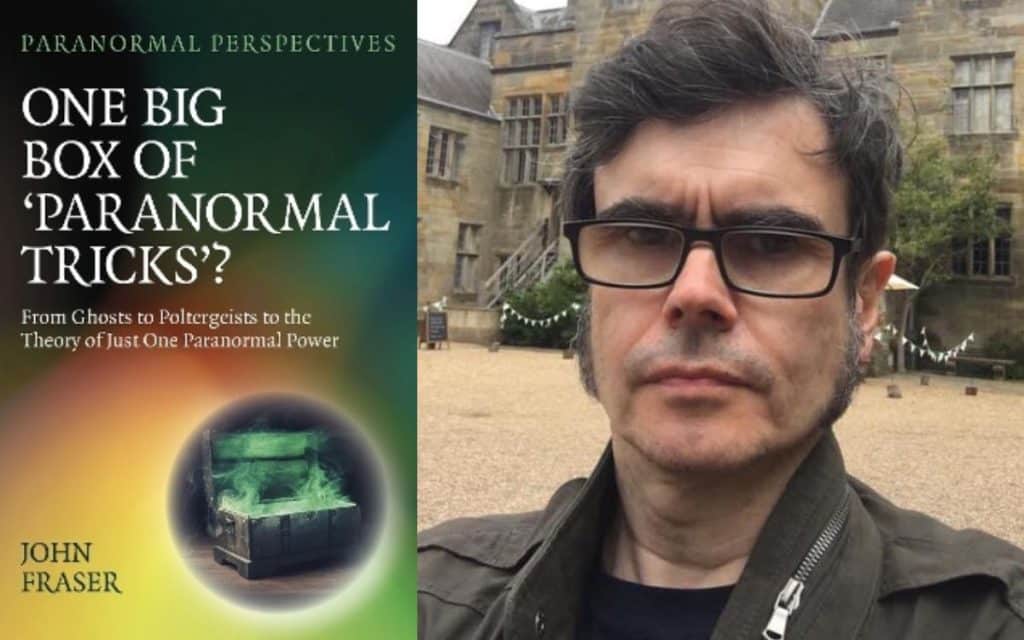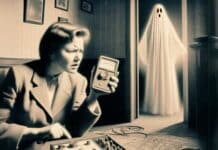John Fraser talks to Spooky Isles about his new book, Paranormal Perspectives: One Big Box of ‘Paranormal Tricks’?, where he shares his views on paranormal phenomena, questions fixed beliefs like demonology, and highlights the importance of fair and open-minded investigations

SPOOKY ISLES: Thanks for joining us, John. Another great book from you that raises and answers many questions often discussed in the paranormal community. How do you balance being open to paranormal possibilities while staying sceptical when encountering strong evidence?
JOHN FRASER: Hi David, and thanks for taking the time to interview me for SpookyIsles.com.
The strange thing is, I actually have a ‘sceptical belief system’. I am an atheist turned agnostic, but what I cannot explain is the consistency of similar types of paranormal phenomena reported worldwide. Once different cultural expressions are removed, the actual phenomena appear to be the same.
I am therefore intrigued by what seems to be one of our last great mysteries and believe my mindset allows me to explore such things with a fairly open mind. However, I’m not sure a sceptic should remain sceptical if strong evidence is found. Surely, the process is to study and learn from the evidence, wherever it guides you.
You suggest that all paranormal occurrences might be connected under one overarching theory. Can you explain more about how that might work and what would prove it?
The short answer is that I can’t explain the actual mechanics of paranormal events with any certainty — sorry about that! It would have been quite the scoop for Spooky Isles if I could.
However, anyone who claims otherwise, unless they are a ‘Messenger of God’ or a ‘genius from another dimension’, is likely confusing knowledge with their own belief system.
While my book does use the word ‘theory’ in its title, it’s more about offering guidance on how we should think about and connect seemingly different paranormal events. The book demonstrates that paranormal events we consider separate often have striking similarities.
In science, one coherent theory tends to replace another over time. So is it really logical to assume numerous different paranormal traditions are based on entirely separate power sources?
Are spiritualists who sometimes summon Native American spirit guides to gain inexplicable information really that different from the ‘wicked’ occultist Aleister Crowley, who claimed to conjure his ‘Guardian Angel’ Aiwas, enabling him to automatically write his Book of the Law in only two hours?
I know these two traditions would hate to be compared, but I think the similarities are rather obvious in the end.
You’re critical of Ed and Lorraine Warren’s focus on demons. What do you see as the biggest issue with approaching paranormal cases this way?
If you call yourself a ‘demonologist’, you are, by definition, putting the ‘answer’ before the paranormal question is even asked. We all have our belief systems, but if we are investigating the paranormal, we shouldn’t have our own personal ‘pet’ theory printed on our business cards.
You might argue that calling yourself a ‘ghost hunter’ does the same to some extent. That would be correct — up to a point. However, the term ‘demonologist’ is heavily loaded with ‘evil’ connotations. It’s far from ideal when visiting someone’s home, where it’s likely to scare the residents far more than the actual phenomena. Imagine being told there’s a ‘portal to hell’ in the kitchen or an ‘angel of Satan’ hiding under the staircase.
Perhaps I’m exaggerating — but only a little — to make an important point. ‘Paranormal investigator’ seems to me the perfect neutral term to use.
You mention people being in certain mental states when experiencing paranormal events. Do you think some individuals are more predisposed to such experiences because of how their minds work?
Most of us can run to some extent, but few can run a mile in four minutes, even after intensive training. About five per cent of the population can be easily hypnotised — it’s that five per cent stage hypnotists tend to bring on stage.
It therefore seems logical to assume that people’s bodies and minds work differently, and some are better ‘attuned’ to experiencing paranormal events than others.
Perhaps it’s not just about ‘experiencing’ phenomena, though. Maybe the experiencer could also be the creator — either acting as a catalyst for an external ‘power’ or activating unknown internal powers of the mind itself.
I’m hardly the first to explore this idea; many have done so in the past, including Hilary Evans and Colin Wilson. Perhaps the ‘new wave’ of paranormal TV in the 2000s has reinvented all the categories like demons, ghosts, poltergeists, shadow people and even vampires.
Remember, however, that many of these programmes come with a ‘for entertainment only’ disclaimer. How entertaining they are, I’ll leave your readers to decide.
What was the hardest or most frustrating paranormal investigation you’ve done, and did it change your views on the paranormal?
The hardest ones are when I’ve spent nights in the cold, only for nothing to happen. I enjoy the paranormal too much for an interesting case to feel like hard work.
The most frustrating investigation was my stay at 30 East Drive. I spent the day in local archives, discovering that the supposed ‘Black Monk’ identity of the phenomena was likely incorrect. Then, nothing happened during my stay that night.
That wouldn’t have been too bad, except that some of my fairly sceptical colleagues stayed another night — and all kinds of noises ‘kicked off’ in one of the bedrooms! It was like turning up for a party a day too early!
What makes a good, ethical paranormal investigator today?
On the ethical side, we must recognise there are two types of paranormal investigations: those in ‘public spaces,’ where the ethical rules can be more relaxed, and those in private homes, where the residents’ well-being must always come first.
In the famous Thornton Heath poltergeist case of the 1930s — just a few hundred yards from where I now live — Nandor Fodor, also known for investigating the ‘talking mongoose‘ of Cashen’s Gap, reportedly arranged for the strip-searching of the woman thought to be the catalyst for the events.
Whether there was trickery involved is almost irrelevant. Such actions, in my opinion, go too far, even in the name of science.
That said, all paranormal investigators make mistakes, and I’ve taken care to criticise myself just as much in my book.
What’s the most important lesson you’ve learned after years of investigating the paranormal?
When investigating private residences, the first rule of thumb is: do no harm. The well-being of the occupants should always come before our curiosity.
Researching a location and hearing witnesses’ experiences has taught me far more than spending one inconclusive night in a ‘haunted’ house or place.
And while ‘romance’ isn’t a scientific term, never forget to enjoy the ‘romance’ of our fascinating subject.
John Fraser’s book, Paranormal Perspectives: One Big Box of ‘Paranormal Tricks’?, is available from Amazon.
Tell us your thoughts on this article in the comment section below!







